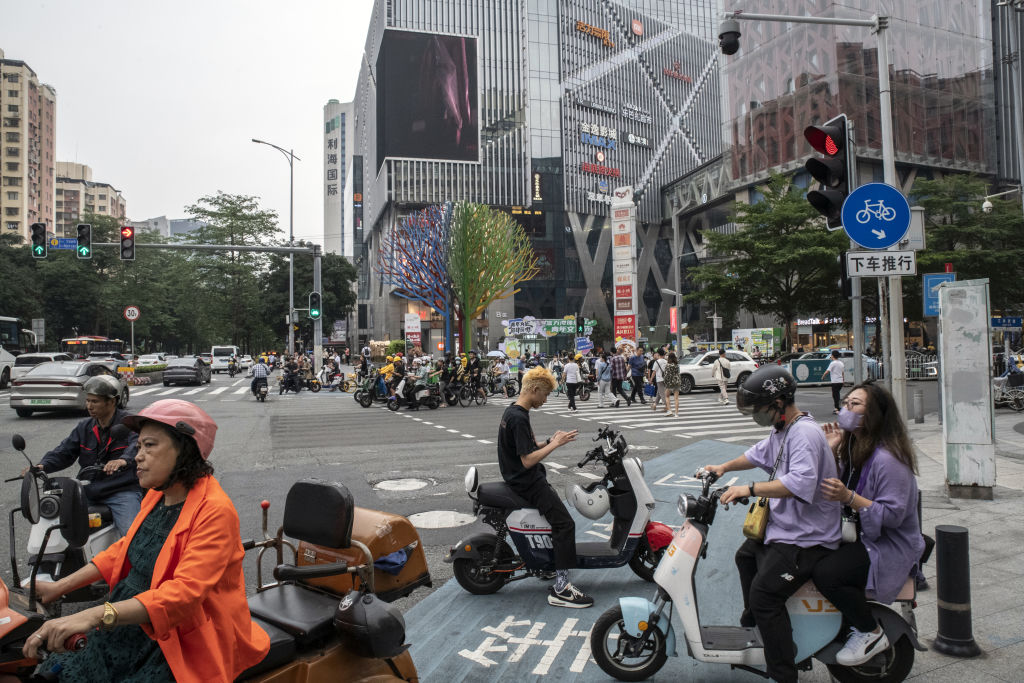
An unexpected alternative mode of transport is gaining attention this week in the southern Chinese city of Guangzhou, with videos circulating on social media of dozens of able-bodied youths cruising the streets on electric wheelchairs.
It’s unclear to what extent people are actually starting to ride wheelchairs in the city, but the videos have soared in popularity as authorities in Guangzhou are mulling new restrictions on e-bikes and scooters, vehicles that have become ubiquitous over the last few decades on China’s urban streets due to their convenience and affordability. There were an estimated 300 million e-bikes in the country in 2021, with tens of millions more expected to have sold since, especially after a surge in sales following the easing of pandemic controls last year.
The proliferation of e-bikes and scooters, once promoted by Beijing, however, has exacerbated concerns of overcrowding in public areas, road safety, and fire safety—prompting a series of crackdowns over the years by local governments across the country. Guangzhou authorities told reporters at a press briefing on Monday that they’ve received over 5,000 feedback letters from residents, most of which said there urgently needs to be stricter measures to curb the over 3.6 million e-bikes in the city. Over the past month, the Guangzhou government has been collecting public feedback on proposed e-bike regulations, such as restricting timings for riders to go on the road and banning e-bikes in selected districts.
More from TIME
But certainly not everyone welcomes the crackdown. E-bike and scooter riders, of which there are evidently many, are pushing back. Some have described the viral videos of people using electric wheelchairs to get around as a tongue-in-cheek “protest” against the prospect of tightening regulations on their preferred vehicles.
Read More: Why a Blank Sheet of Paper Became a COVID Protest Symbol in China
“They’re not disabled, but were forced to become disabled” reads one comment on a video posted on Douyin, the Chinese version of TikTok. “This is also an extreme show of sarcasm to the administration,” reads another Douyin comment.
The discussions over e-bike regulations in Guangzhou coincide with another recent social media sensation: a widely shared screenshot of what appeared to be harsh scooter regulations—including banning people from riding scooters with just one hand and mandating riders to dismount and push their scooters across crosswalks, or zebra crossings. The list of regulations, purported to be taking effect nationwide, was later reported to be false, but not before it sparked a wave of public outcry online.
China’s crackdown on e-bikes and scooters may stand in stark contrast to its government-led fervor for electric cars and global efforts to transition to greener modes of transport. But it also reveals the increasing tensions felt globally as the growing number of electric two-wheelers struggle to coexist with more traditional road users and existing road layouts.
From New York to Berlin, authorities have been grappling with the huge task of adjusting city infrastructure to accommodate the increasing number of e-bike and scooter riders. In Europe, e-scooters have been blamed for increased road accidents, incurring the wrath of cyclists, drivers, and pedestrians—and, in April, Parisians voted to ban rental e-scooters altogether.
Other countries that have tried to take e-bikes off the road have also been met with backlash, especially among professional deliverers whose livelihoods depend on their vehicles. The impact that restricting e-bikes would have on such delivery drivers is one major concern among residents in Guangzhou, a traffic police representative said at the Monday press briefing, adding that authorities will do their best to reduce the impact on sellers and deliverers.
Alfred Wu, an associate professor who researches Chinese governance at Singapore’s Lee Kuan Yew School of Public Policy, tells TIME that instead of viewing the electric wheelchair-sitting, loophole-finding youths in Guangzhou as mere jokers, the ongoing social media discourse instead reflects a common downside of China’s blanket approach to curbing undesirable behavior.
“It’s [a] problem of Chinese public policy making,” he says. “They always want [a] one-size-fits-all solution, but in reality, it’s more complicated.”
More Must-Reads from TIME
- Cybersecurity Experts Are Sounding the Alarm on DOGE
- Meet the 2025 Women of the Year
- The Harsh Truth About Disability Inclusion
- Why Do More Young Adults Have Cancer?
- Colman Domingo Leads With Radical Love
- How to Get Better at Doing Things Alone
- Michelle Zauner Stares Down the Darkness
Contact us at letters@time.com



